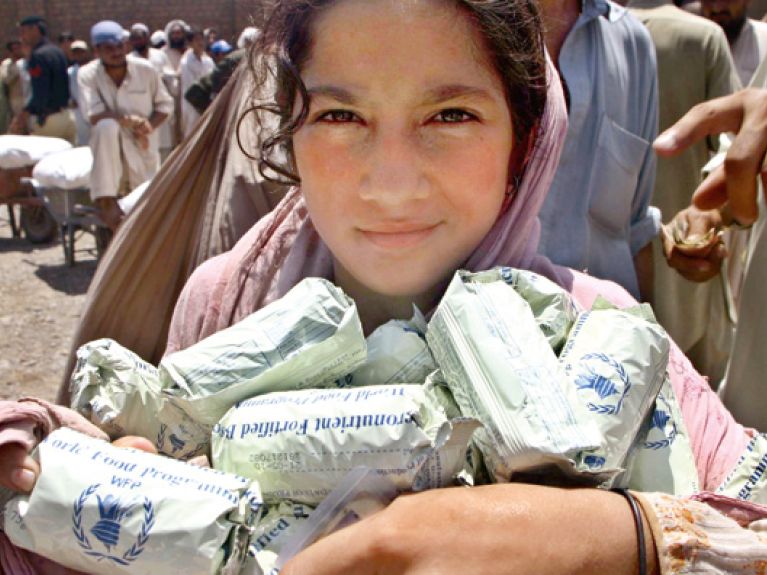The EU on the world stage
Democracy, human rights, development and climate change are at the very top of the EU’s foreign policy agenda

They are plying the waters of the world’s most dangerous sea: since summer 2014, the German Navy’s Brandenburg frigate and Rhön supply ship have been patrolling off the coast of Somalia – on behalf of the European Union (EU). Together with three other military vessels from Spain, Italy and France they are busy protecting international shipping from attack by pirates and thus securing the most important trade route in the Gulf of Aden, in this way also enabling humanitarian aid to reach Somalia safely. For many years, the waters were a nest of piracy. Now, things have improved considerably, not least thanks to EU NAVFOR – Operation Atalanta, the mission launched in 2008 and led by the EU.
The mission on the Horn of Africa is a success for European foreign policy, or to be more precise for the EU’s Common Security and Defence Policy (CSDP), which is an integral part of the Common Foreign and Security Policy (CFSP). The EU commitment to East Africa is by no means limited to military deployments, but, and this is a key feature of European foreign policy, is based on a holistic approach: different elements in the collection of instruments of EU external action strengthen Somalia’s civil society and governance structures and lay the foundations for economic development. Crisis prevention, managing crises and follow-up after conflicts are fields of action that are at the top of the CFSP agenda. Most current foreign and security policy flashpoints worldwide are issues that EU foreign policy addresses.
The Treaty of Maastricht on the European Union established the CFSP in 1993 on the back of the insight that the EU member states (there are 28 of them today) only have international clout if they act together. This was intended to put paid to the long prevalent view that although the EU was the world’s largest trading power with over 500 million inhabitants, and thus an economic giant, it remained a political dwarf. Former US Secretary of State Henry Kissinger is quoted as saying as long as Europe didn’t have a single phone number, it couldn’t be an actor on the foreign policy stage. Those times are long gone. At the end of 2009 the CFSP was further strengthened by the introduction of the office of the High Representative for Foreign and Security Policy, who is also a Vice-President of the European Commission. It will be Italian Federica Mogherini who answers the key telephone in the EU capital of Brussels from November 2014, when she succeeds Britain’s Catherine Ashton, who was the first person to hold the office.
The CFSP does not replace the foreign policy of the individual EU member states; foreign policy is not shared. In other words, the governments of the EU member states have to work together and are obliged to do nothing that would run counter to the CFSP. Each month, the High Representative coordinates policy with the 28 foreign ministers of the EU member states at a meeting of the Foreign Affairs Council with the 28 foreign ministers of the EU member states – and twice a year she also meets with the defence, development and trade ministers. This means diplomatic skill is also required internally within the community since in most cases the member states’ decisions on the CFSP must be unanimous. There is an obligation to inform and consult the European Parliament (EP) on foreign policy issues. Twice a year, the EP debates CFSP progress and the High Representative is expected to “duly consider” the opinions of the MEPs. The President of the European Council and the Commission President also represent the EU at their level in the area of external action.
The EU has set itself an extremely broad range of topics as a global actor and partner. The most important goals include preserving the peace and strengthening international security, developing democracy and the rule of law, and upholding human rights. Firm fields of action include development cooperation and humanitarian aid as well as election observer missions. The EU is strongly committed worldwide to combatting climate change and to forming an alliance for a legally binding treaty. It engages in neighbourhood policy with the eastern partners and the countries on the southern Mediterranean rim, and also concerns itself with the pressing issues of migration and terrorism. In addition, it focuses intensively on promoting a freer and more just system of international trade.
Given the gamut of tasks, a large number of committed people are needed to implement policy. At the end of 2009, when the Treaty of Lisbon entered into force, the European External Action Service (EEAS) was established. It now has a total of 3,500 staff. German diplomat Stephan Auer has been one of them for the last 18 months. As Director for Multilateral Relations and Global Issues he is responsible for dealing with day-by-day crises, development policy and cooperation with organisations such as the United Nations and the European Council. Then there is the more longer-term issue of climate and energy, an area that often has difficulty gaining a central place on the Foreign Affairs Council’s agenda in the face of the plethora of urgent conflicts. “Climate change must concern us all for the simple reason that it causes so much tension,” comments Auer, “and the topic of energy plays a key role, for example in the Ukraine crisis.”
He considers setting priorities within the sum total of the national interests of EU member states to be one of the key tasks of the EEAS, because that enables the EU to take a coherent stance on the international stage despite having several countries active in foreign policy. “Of course the EEAS can’t do everything,” Auer says. Accordingly, it needs to divide the tasks up and collaborate with diplomats from the member states. He believes that the strengths of European foreign policy are to be found above all in the field of “soft power”, meaning acting as diplomatic intermediaries and coordinators. “Moreover, we must start not only treating the symptoms but actually tackling the problems at the root,” he explains, adding that usually a lack of economic development is the central cause of conflicts. “That can only succeed if we have medium-to-long term policies in place, with a comprehensive range to them.” This is exactly what the EU is attempting with its mission in Somalia. ▪

